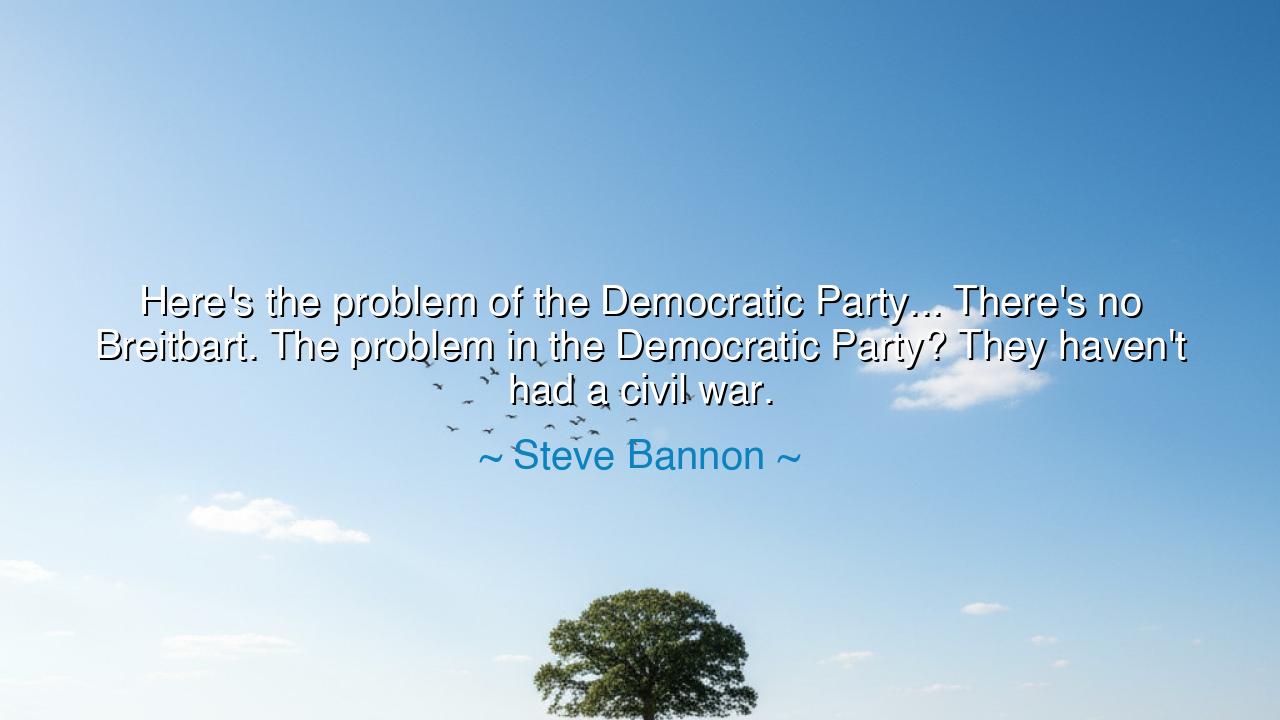
Here's the problem of the Democratic Party... There's no
Here's the problem of the Democratic Party... There's no Breitbart. The problem in the Democratic Party? They haven't had a civil war.






Hear the fierce and unsettling words of Steve Bannon, strategist of storms and voice of disruption: “Here’s the problem of the Democratic Party... There’s no Breitbart. The problem in the Democratic Party? They haven’t had a civil war.” These words, sharp as daggers, are not meant to soothe, but to provoke. They reveal a philosophy that sees conflict as a crucible, division as a forge, and struggle within a movement as the fire by which it is made strong.
The origin of this saying lies in Bannon’s years as chief executive of Breitbart News, a platform that did not merely report but sought to shape politics with unyielding force. Breitbart was born from a belief that the conservative movement in America needed its own cultural weapon, an outlet that would fight fiercely, give no quarter, and drive internal battles until the weak were cast out. Bannon himself embraced the imagery of “war”—political war, cultural war, and civil war within parties—as the path to renewal and dominance.
The meaning of his words is thus: a movement that has not endured internal struggle remains soft, untested, and fractured beneath the surface. By pointing to the Democratic Party, Bannon suggests that its lack of a powerful, uncompromising voice like Breitbart is both a weakness and a symptom of avoiding internal conflict. In his view, it is the purging fire of a “civil war” that clarifies vision, eliminates compromise, and arms a movement for victory. Without such a struggle, he implies, the Democrats remain vulnerable.
History offers examples of this principle. Consider the Republican Party during the rise of the Tea Party in the early 2010s. Fierce internal battles shook the establishment, driving out moderates and pushing the party toward a new, insurgent identity. Though chaotic, this internal war energized its base and helped reshape national politics. By contrast, when movements fear internal strife and cling to fragile unity, they risk stagnation and disconnection from the passion of their people. Thus, in Bannon’s reckoning, the absence of a civil war is not peace—it is weakness.
Yet there is another truth to be seen. For not all civil wars strengthen; some consume. The ancient Roman Republic was torn apart by its internal conflicts, its factions devouring each other until Caesar rose and the republic fell into empire. So too, revolutions often perish when internecine struggles eclipse their greater purpose. Bannon’s words glorify the struggle within, but history warns us that such fire, once lit, can blaze beyond control, leaving ashes where once there was promise.
The lesson for us is twofold. First, that no movement or party can remain forever untested: sooner or later, it must reckon with its divisions. And second, that the manner of this reckoning determines its fate. A civil war of ideas, waged with honesty and courage, can refine and renew. But a civil war of bitterness, driven by ambition and hate, can destroy the very house it was meant to strengthen. The fire can forge steel—or it can consume the forge itself.
What, then, must we do? We must not shrink from disagreement, for silence breeds weakness. We must engage in honest struggle, speaking truth even when it wounds. But we must also temper conflict with vision, remembering that a movement, like a nation, exists not for the destruction of its rivals within, but for the fulfillment of a higher purpose. To fight endlessly without aim is folly; to fight for renewal, and then to unify, is wisdom.
Therefore, let Bannon’s words be received not only as a provocation but as a warning. Parties, nations, and peoples must face their civil wars, whether of ideology or conscience. But in doing so, let them choose the path of refinement, not ruin. For the greatest danger is not in the fire itself, but in forgetting why the fire burns—to temper the steel of a people so that they may endure.






DNNguyen Thi Dung Nhi
I can’t decide if this comment is an observation or a provocation. It feels like Bannon is daring Democrats to tear themselves apart the way the Republicans did, just to find ideological purity. But I wonder — is polarization the only path to influence now? Or could moderation itself become the next form of rebellion in such a divided era?
NTmy ngan tran
This statement makes me question how much of modern politics is about ideas versus media influence. Bannon references Breitbart as if it were essential infrastructure for shaping narratives and mobilizing people. Is he implying that media ecosystems define party strength more than actual policy? That’s a troubling but probably accurate reflection of how political power works today.
HHuy
I’m struck by how Bannon frames division as a strength. It’s a very strategic way of viewing politics — that conflict leads to power consolidation. But it also feels dangerous. If every political movement believes internal war is the path to success, doesn’t that risk turning governance into a perpetual battle rather than a process of public service?
AABCD
What I find interesting here is the implication that chaos breeds clarity. Bannon seems to admire the turmoil that reshaped the Republican Party, implying that Democrats need a similar shake-up. But is that healthy for democracy? Do we really want both major parties fueled by conflict and extremism, or should stability and compromise still have value in modern politics?
TSPham Thanh Sang
This quote makes me wonder if Bannon is suggesting that internal conflict is necessary for a political party’s evolution. It’s a provocative idea — that without a major internal struggle, a party can’t redefine itself or sharpen its identity. But is a ‘civil war’ really the only way to achieve renewal? Could collaboration and ideological diversity not serve the same purpose more constructively?